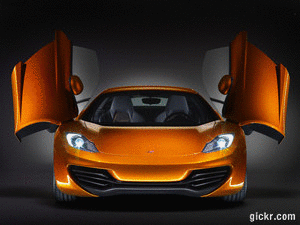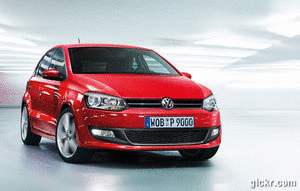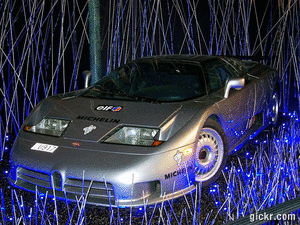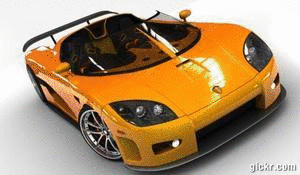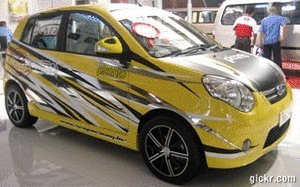Wiesmann GT, 2006





The success of the Roadster concept is based on a successful synthesis of classic design and state-of-the-art engineering. This encouraged Friedhelm and Martin Wiesmann to develop a new, similarly fascinating, sports car on the basis of the Roadster, the Wiesmann GT.
The 2-seater coupé celebrated its premiere as a production vehicle at the IAA 2005 in Frankfurt, to be acclaimed by the motoring experts.
Despite the suggestions of a classic design as a further development of the Wiesmann-Roadster it was a completely new car which was created. Basic data were gained from the Wiesmann Racing GT, which was tested as a experimental vehicle under extreme conditions during the 24-hour race at the Nürburgring in 2002.
Since it was clear from the outset that this vehicle would not only be optically different, but based on different fundamental data, from the Roadster, there was plenty of room for manoeuvre in the development. Starting point for considerations was the engine. This was to represent a new sparkle, come what might.
Since, as it is well known, displacement can only be replaced by one thing, and that is more displacement, thoughts quickly made friends with the idea of using a BMW V8 engine of 4.8 litres capacity. This made a larger engine compartment than the Roadster's essential, which consequently meant that all the dimensions of the Wiesmann GT would have to be oriented towards that.
The GT grew in all directions, compared with the Roadster: it was three centimetres higher, eleven wider, and no less than 37 longer. To take account of the rather higher fuel consumption of the larger engine, 10 litres additional fuel tank volume was provided, at 70 litres, to guarantee adequate range on longer journeys.
The challenge now facing the engineers was to convert the engine's output into vehicle dynamics. Normally, a larger vehicle also weighs more, which in turn adversely affects the performance figures. This was avoided by designing an aluminium monocoque, familiar from the racing scene. In this way, the increase in weight was kept within bounds, and at 70 kg was extremely modest for a car of this size. The bodywork is of lightweight, high-quality, fibreglass-reinforced compound material and in the familiar manner is also fabricated in the factory.
The xenon headlights ensure good visibility in darkness, and the rear lights, which consist of LEDs, not only give a clear signal but are also unmistakable as the hallmark of the Wiesmann GT even at night.
With a power-to-weight ratio of 3.41 kg/HP the Wiesmann GT is to be found in the leading group of sports cars. The low centre of gravity, the perfectly-tuned running gear combined with the bullish torque delivered by the engine, the optimum seating position for driver and passenger ensure unalloyed driving enjoyment.
The Wiesmann GT is an individual sports car with a classic design, which fits perfectly in the automotive landscape and which will capture its own niche.
Base price: € 111.000 incl. VAT
The 2-seater coupé celebrated its premiere as a production vehicle at the IAA 2005 in Frankfurt, to be acclaimed by the motoring experts.
Despite the suggestions of a classic design as a further development of the Wiesmann-Roadster it was a completely new car which was created. Basic data were gained from the Wiesmann Racing GT, which was tested as a experimental vehicle under extreme conditions during the 24-hour race at the Nürburgring in 2002.
Since it was clear from the outset that this vehicle would not only be optically different, but based on different fundamental data, from the Roadster, there was plenty of room for manoeuvre in the development. Starting point for considerations was the engine. This was to represent a new sparkle, come what might.
Since, as it is well known, displacement can only be replaced by one thing, and that is more displacement, thoughts quickly made friends with the idea of using a BMW V8 engine of 4.8 litres capacity. This made a larger engine compartment than the Roadster's essential, which consequently meant that all the dimensions of the Wiesmann GT would have to be oriented towards that.
The GT grew in all directions, compared with the Roadster: it was three centimetres higher, eleven wider, and no less than 37 longer. To take account of the rather higher fuel consumption of the larger engine, 10 litres additional fuel tank volume was provided, at 70 litres, to guarantee adequate range on longer journeys.
The challenge now facing the engineers was to convert the engine's output into vehicle dynamics. Normally, a larger vehicle also weighs more, which in turn adversely affects the performance figures. This was avoided by designing an aluminium monocoque, familiar from the racing scene. In this way, the increase in weight was kept within bounds, and at 70 kg was extremely modest for a car of this size. The bodywork is of lightweight, high-quality, fibreglass-reinforced compound material and in the familiar manner is also fabricated in the factory.
The xenon headlights ensure good visibility in darkness, and the rear lights, which consist of LEDs, not only give a clear signal but are also unmistakable as the hallmark of the Wiesmann GT even at night.
With a power-to-weight ratio of 3.41 kg/HP the Wiesmann GT is to be found in the leading group of sports cars. The low centre of gravity, the perfectly-tuned running gear combined with the bullish torque delivered by the engine, the optimum seating position for driver and passenger ensure unalloyed driving enjoyment.
The Wiesmann GT is an individual sports car with a classic design, which fits perfectly in the automotive landscape and which will capture its own niche.
Base price: € 111.000 incl. VAT
